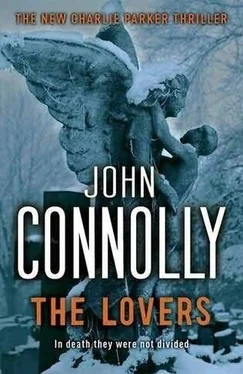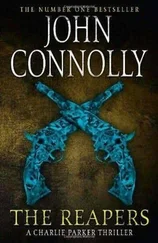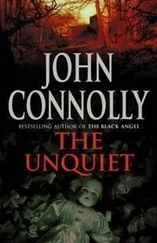John Connolly - The Lovers
Здесь есть возможность читать онлайн «John Connolly - The Lovers» весь текст электронной книги совершенно бесплатно (целиком полную версию без сокращений). В некоторых случаях можно слушать аудио, скачать через торрент в формате fb2 и присутствует краткое содержание. Жанр: Триллер, на английском языке. Описание произведения, (предисловие) а так же отзывы посетителей доступны на портале библиотеки ЛибКат.
- Название:The Lovers
- Автор:
- Жанр:
- Год:неизвестен
- ISBN:нет данных
- Рейтинг книги:4 / 5. Голосов: 1
-
Избранное:Добавить в избранное
- Отзывы:
-
Ваша оценка:
- 80
- 1
- 2
- 3
- 4
- 5
The Lovers: краткое содержание, описание и аннотация
Предлагаем к чтению аннотацию, описание, краткое содержание или предисловие (зависит от того, что написал сам автор книги «The Lovers»). Если вы не нашли необходимую информацию о книге — напишите в комментариях, мы постараемся отыскать её.
The Lovers — читать онлайн бесплатно полную книгу (весь текст) целиком
Ниже представлен текст книги, разбитый по страницам. Система сохранения места последней прочитанной страницы, позволяет с удобством читать онлайн бесплатно книгу «The Lovers», без необходимости каждый раз заново искать на чём Вы остановились. Поставьте закладку, и сможете в любой момент перейти на страницу, на которой закончили чтение.
Интервал:
Закладка:
He held out his hand, and I shook it.
“How long have you lived here?” I asked.
“Twelve years, give or take. The Harringtons were here before us, but they sold it and moved to Dakota. Don’t know if it was North or South. Don’t suppose it matters much, seeing as how it was Dakota.”
“You been to Dakota?”
“Which one?”
“Either.”
He smiled mischievously, and I saw clearly the young man now trapped in an old man’s body. “Why would I want to go to Dakota?” he asked. “You want to come inside?”
I heard myself say the words before I even realized I had made the decision.
“Yes,” I said, “if it’s not an imposition.”
“Not at all. My wife will be home soon. She plays bridge on Sunday afternoons, and I cook dinner. You’re welcome to stay, if you’re hungry. It’s pot roast. Always pot roast on Sundays. It’s the only thing I can cook.”
“No, thank you. It’s good of you to offer, though.”
I walked alongside him up the garden path. His left leg dragged slightly.
“What do you get in return for cooking dinner, or am I allowed to ask?”
“An easier life,” said Durand. “To sleep in my bed without fear of suffocation.” The smile came again, soft and warm. “And she likes my pot roast, and I like it that she does.”
We reached the front door. Durand went ahead and held it open. I paused on the step for a moment, then followed him inside, and he closed the door behind me. The hallway was brighter than I remembered. It had been painted yellow with white trim. When I was a boy, the hallway had been red. To the right was a formal dining room, with a mahogany table and chairs not dissimilar to the set we had once owned. To the left was the living room. There was a flat-screen high-definition TV where our old Zenith used to stand, in the days when VCRs were still a novelty and the networks had instituted a family hour to protect the young from sex and violence. When was that-’74, ’75? I couldn’t recall.
There was no longer a wall between the kitchen and the living room. It had been removed to create a single, open-plan space, so that the little kitchen of my youth, with its four-seat table, was now entirely gone.
I could not picture my mother in the new space.
“Different?” asked Durand.
“Yes. This is all different.”
“The other people did that. Not the Harringtons, the Bildners. They the ones you sold to?”
“That’s right.”
“It was vacant for a time too. Couple of years.” He looked away, troubled by the direction the conversation was taking. “Would you like a drink? There’s beer, if you want. I don’t drink it so much now. Goes through me like water down a pipe. Hardly in one end before it’s out the other. Then I have to nap.”
“It’s a little early for me. I’ll take a cup of coffee, though, if I don’t have to drink it alone.”
“Coffee we can do. At least I don’t have to nap after it.”
He switched on an ancient, stained coffeemaker, then rounded up some cups and spoons.
“Would you mind if I looked in my old bedroom?” I asked. “It’s the small one in the front, with the broken pane.”
Durand winced again, and looked a little embarrassed. “Damned pane. Kids broke it playing baseball. I just didn’t get around to fixing it. And then, well, we don’t use that room for much other than storage. It’s full of boxes.”
“It doesn’t matter. I’d still like to see it.”
He nodded, and we went upstairs. I stood at the threshold of my old bedroom, but I did not enter. As Durand had said, it was a mass of boxes, files, books, and old electrical equipment that was now gathering dust.
“I’m a packrat,” said Durand apologetically. “All that stuff still works. I keep hoping someone will come along who might need it and take it off my hands.”
As I stood there, the boxes disappeared, vanishing along with the junk and the books and the files. There was only a room carpeted in gray; white walls covered with pictures and posters; a closet with a mirror on the front in which I could see myself reflected, a man in his forties with graying hair and dark eyes; shelves lined with books, carefully ordered according to author; a nightstand with a digital alarm clock, the height of technology, showing a time of 12:54 P.M.
And the sound of the gunshot carrying from the garage at the back of the house. Through the window, I saw men running-
“Are you okay, Mr. Parker?”
Durand touched my arm gently. I tried to speak, but I could not.
“Why don’t we go downstairs? I’ll make you that cup of coffee.”
And the figure in the mirror became the ghost of the boy I once was, and I held his gaze until he slowly faded away and was gone.
We sat in the kitchen, Asa Durand and I. Through the window, I could see a copse of silver birch where the garage used to be. Durand followed my gaze.
“I heard about what happened,” he said. “A terrible thing.”
The room was filled with the aroma of Durand’s pot roast. It smelled good.
“Yes, it was.”
“They knocked it down, the garage.”
“Who did?”
“The Harringtons. The neighbors, Mr. and Mrs. Rosetti-they were probably after your time by a couple of years-told me about it.”
“Why did they knock it down?” But even as I asked the question, I already knew the answer. The only surprise was that it had stayed intact for as long as it had.
“I guess there are those who feel that, when something bad happens in a place, the echo of it remains,” said Durand. “I don’t know if that’s true. I’m not sensitive to such things myself. My wife believes in angels”-he pointed at a wispily clothed winged figure hanging from a hook on the kitchen door-“except all her angels look like Tinkerbell to m="0‘kerbell te. I don’t think she can tell the difference between angels and fairies.
“Anyway, the Harrington kids didn’t like going into the garage. The youngest one, the little girl, she said it smelled bad. The mother, she told Mrs. Rosetti that sometimes it smelled-”
He paused, and winced for a third time. It seemed to be an involuntary response when anything discomfited him.
“It’s okay,” I said. “Go on, please.”
“She told her that it smelled like a gun had gone off in there.”
We were both silent for a time.
“Why are you here, Mr. Parker?”
“I’m not sure. I think I have some questions I need answered.”
“You know, you get the urge, at a certain point in your life, to go digging around in the past,” said Durand. “I sat my mother down before she died and made her go through our whole family history, everything that she could remember. I wanted to have that knowledge, I guess, to understand what I was part of before anyone who could clear that stuff up for me was gone forever. And that’s a good thing, to know where you came from. You pass it on to your children, and it makes everyone feel less adrift in life, less alone.
“But some things, they’re better left in the past. Oh, I know that psychiatrists and therapists and Lord knows who else will tell you different, but they’re wrong. Not every wound needs to be poked and opened, and not every wrong needs to be reexamined, or dragged kicking and screaming into the light. Better just to let the wound heal, even if it doesn’t heal quite right, or to leave the wrongs in the dark, and remind yourself not to go stepping into the shadows if you can avoid it.”
“Well, that’s the thing of it,” I said. “Sometimes, you can’t avoid those shadows.”
Durand pulled at his lip. “No, I guess not. So, is this the beginning, or the end?”
“The beginning.”
“You got a long road ahead of you, then.”
Читать дальшеИнтервал:
Закладка:
Похожие книги на «The Lovers»
Представляем Вашему вниманию похожие книги на «The Lovers» списком для выбора. Мы отобрали схожую по названию и смыслу литературу в надежде предоставить читателям больше вариантов отыскать новые, интересные, ещё непрочитанные произведения.
Обсуждение, отзывы о книге «The Lovers» и просто собственные мнения читателей. Оставьте ваши комментарии, напишите, что Вы думаете о произведении, его смысле или главных героях. Укажите что конкретно понравилось, а что нет, и почему Вы так считаете.












